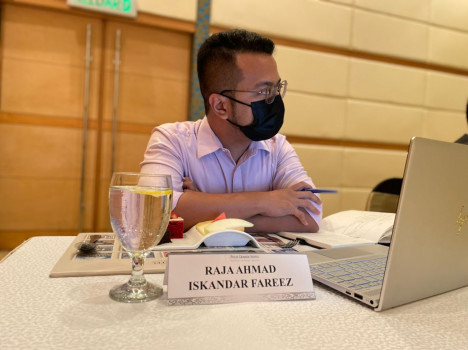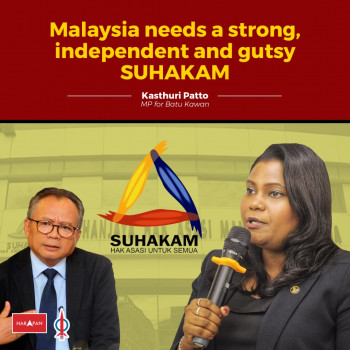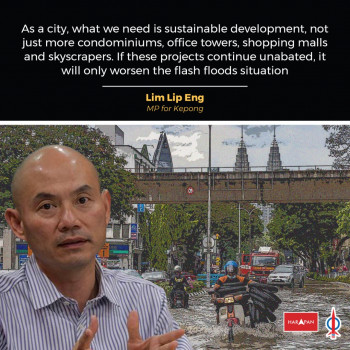by Islamic Rennaissance Front (IRF)
A statement by Pembela, a coalition of Muslim NGOs is referred.
Therefore we have heard the debate on the nature of this country for decades among the legal experts and also the academics. Along its course many have expressed their opinion on the status of Malaysia and IRF has been actively involved in the discussion and stated its position many times including at the forum by the Bar Council on “How Secular Is Our Constitution?”
It should be reminded that there are different types of secularism in which Malaysia endorses the positive one in order to protect the variety of religions cohabiting on its territory.With that type of secular approach, the government does not deny the inherent right of its citizens to profess any religions equally supports them and protects their other rights including the right to participate in public life and civil service irrespective of their religious denomination. This is an ideal construction, which was implemented in Malaysia with some asymmetries due to the special historical conditions.
First of all, two different abodes should be addressed, the legal sphere and the real practices, which do not always necessarily coincide.
For the “Constitution is the supreme law of the Federation and any law passed after Merdeka Day which is inconsistent with this Constitution shall, to the extent of the inconsistency, be void”.
Now compare this statement to that of an Islamic State, where the Qur’an is supposed to be the highest authority.
Instead, the validity of the laws is measured upon the yardstick of the Constitution and not on Islamic principles, thus making the Constitution a secular one.
To some extent race and religion interfuse the document in a way that scream “different treatment for different people” would seem out of place with the growing zeitgeist of the time.
However, considering the socio-political situation at the time, with an indigenous population feeling overwhelmed both in numbers and in economic disparity, the nature of the Constitution can be accepted as an understandable compromise.
Yet, if one were to examine the Constitution as a whole and if one were to also study the history behind this seeming paradox, then what can be discovered is that at the heart of this “supreme law” of the country, and arguably at the heart of the founding fathers of the nation, lays a desire to create a pluralistic and equal society.
Article 3 of the Constitution reads: “Islam is the religion of the Federation; but other religions may be practiced in peace and harmony in any part of the Federation”. Now, does this phrase mean that Malaya was to be an Islamic state? The answer is clearly in the negative.
On page 73 of the Reid Commission Report of the Federation of Malaya, the Constitutional Commission upon examining the drafted Constitution says:
“The observance of this principle… shall not imply that the State is not a secular state”.
However, the fact that Malaya was not to be an Islamic state is not an assertion made by the Reid Commission, it is an assertion made by the very people who were to become the government of the newly independent nation. Furthermore, when we examine the Reid Commission report once again, we see that the alliance had this to comment
“… in an independent Malaya all nationals should be accorded equal rights, privileges and opportunities and there must not be discrimination on grounds of race and creed….”.
Such advantages given to the Malays (the Borneo natives were included only in 1963 when Malaya, Sabah, Sarawak and Singapore created Malaysia) were meant to be a stopgap measure to aid the economically disadvantaged Malays.
Article 3 with regard to Islam as the religion of the Federation was taken to mean that as far as official ceremonial matters are concerned, Islamic form and rituals are to be used. The rulers were Constitutional monarchs with limited real power but tremendous symbolic strength, and Islam was given special symbolic recognition as well as real authority over the personal laws of Muslims.
This does not in any way take away from the fact that a secular pluralistic system of governance, one that valued fundamental liberties, in particular equality, was the aim of the Constitution and also the leaders of the time.
In a landmark case of Che Omar bin Che Soh v Public Prosecutor [MLJ 1988], the then Supreme Court held that laws in Malaysia do not have to conform to the Islamic principles, and confirmed that Malaysia is a secular state.
Real practices of Malaysia, however, have not always been consistent with the legal constructions laid at the dawn of its independency.
What has happened in Malaysia in the last few years is that Islam has been dynamically propelled to the centerstage of politics.
It has become a medium for Malay politics, and political demands for greater Islamic purity have multiplied despite the change in political climate when the ruling government does not hold the two-thirds majority.
The Federal Constitution had put in place the necessary foundations to build a secular, pluralistic democracy with provisions to ensure not only equality but also equity.
Malaysia is and should be a secular state due to the spirit the polity was born with.
Malaysia’s Constitution does not define the country as secular as well as it does not call it “Islamic”. Meanwhile, the construction laid by the fundamental law and legal practice allows us to come to a conclusion that Malaysia is a secular country.
Hence, IRF argues that the history and the destination of Malaysia are to be a secular state to ensure the rights of its citizens and integrity of the nation.
And only a secular state alone offers them something most of us seem to badly want: freedom.
Meaning to say, if there really is no compulsion in religion, only a secular society can provide that.
And only in a secular system can Muslims be free to practice Islam exactly as they see fit and out of their own conscience, and not state coercion.
And only in a secular system can non-Muslims be at peace without fear of their rights being compromised and eroded.
* The views expressed in this article are the personal opinion of the columnist



